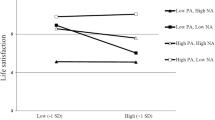Abstract
The influence of affect on causal attributions for success and failure was examined in this experiment. A positive, neurtral, or negative mood was induced in subjects who then learned they had either succeeded or failed an aptitude test taken previously. Relative to neutral mood control conditions, subjects in both positive and negative mood conditions showed a pronounced self-serving bias, particularly following success. The finding is interpreted as self-regulation of affective state. Specifically, causal attribution of success to internal factors can sustain or enhance positive affect; attribution of failure to external factors can diminish negative affect. Ancillary analyses corroborated this interpretation.
Similar content being viewed by others
References
Abramson, L. Y., Seligman, M. E. P., & Teasdale, J. (1978). Learned helplessness in humans: Critique and reformulation.Journal of Abnormal Psychology, 87 49–74.
Arkin, R. M., Gleason, J. M., & Johnston, S. (1976). Effect of perceived choice, expected outcome, and observed outcome of an action on the attributions of actors.Journal of Experimental Social Psychology, 12 151–158.
Beck, A. T. (1976).Cognitive therapy and the emotional disorders. New York: International Universities Press.
Blaney, P. H. (1986). Affect and memory: A review.Psychological Bulletin, 99 229–246.
Bower, G. H. (1981). Mood and memory.American Psychologist, 36 129–148.
Burger, J. M. (1981). Motivational biases in the attribution of responsibility for an accident: A meta-analysis of the defensive-attribution hypothesis.Psychological Bulletin, 90 496–512.
Cialdini, R. B., Kenrick, D. T., & Baumann, D. J. (1982). Effects of mood on prosocial behavior in children and adults. In N. Eisenberg (Ed.),The development of prosocial behavior. New York: Academic Press.
Clark, D. M., & Teasdale, J. D. (1982). Diurnal variation in clinical depression and accessibility of memories of positive and negative experiences.Journal of Abnormal Psychology, 91 87–95.
Clark, D. M., & Teasdale, J. D. (1985). Constraints on the effects of mood on memory.Journal of Personality and Social Psychology, 48 1595–1608.
Descartes, R. (1961).Passions of the soul: Essential works of Descartes (L. Bair, Trans., pp. 108–210). New York: Bantam Books. (Original work published 1649).
Dovidio, J. F. (1984). Helping behavior and altruism: An empirical and conceptual overview. In L. Berkowitz (Ed.),Advances in experimental social psychology (Vol. 17, pp. 361–427). New York: Academic Press.
Frieze, I. (1976). Causal attributions and information seeking to explain success and failure.Journal of Research in Personality, 10 293–305.
Harris, M. B. (1977). Effects of altruism on mood.Journal of Social Psychology, 102 197–208.
Isen, A. M., & Levin, D. F. (1972). The effects of feeling good on helping: Cookies and kindness.Journal of Personality and Social Psychology, 21 384–388.
James, W. (1952).The principles of psychology. In R. M. Hutchins (Ed.),The great books of the western world. Chicago: Encyclopedia Britannica, LIII, 348. (Original work published 1890)
Mills, J. (1976). A procedure for explaining experiments involving deception.Personality and Social Psychology Bulletin, 2 3–13.
Mukherji, B. R., Abramson, L. Y., & Martin, D. (1982). Induced depressive mood and attributional patterns.Cognitive Therapy and Research, 6 15–21.
Peterson, C., & Seligman, M. E. P. (1984). Causal explanations as a risk factor for depression: Theory and evidence.Psychological Review, 91 347–374.
Schwarz, N., & Clore, G. L. (1983). Mood, misattribution, and judgments of well-being: Informative and directive functions of affective states.Journal of Personality and Social Psychology, 45 513–523.
Teasdale, J. D., & Fogarty, S. J. (1979). Differential effects of induced mood on retrieval of pleasant and unpleasant events from episodic memory.Journal of Abnormal Psychology, 88 248–257.
Weiner, B. (1985). An attributional theory of achievement motivation and emotion.Psychological Review, 92 548–573.
Weiner, B., Russell, D., & Lerman, D. (1978). Affective consequences of causal ascriptions. In J. H. Harvey, W. J. Ickes, & R. F. Kidd (Eds.),New directions in attribution research (Vol. 2, pp. 59–88). Hillsdale, New Jersey: Erlbaum.
Weiner, B., Russell, D., & Lerman, D. (1979). The cognition-emotion process in achievement-related contexts.Journal of Personality and Social Psychology, 37 1211–1220.
Zajonc, R. B. (1980). Feeling and thinking: Preferences need no inferences.American Psychologist, 35 151–175.
Zuckerman, M. (1979). Attribution of success and failure revisited, or: The motivation bias is alive and well in attribution theory.Journal of Personality, 47 245–287.
Author information
Authors and Affiliations
Additional information
We thank Christopher Peterson for his invaluable comments on an earlier version of this manuscript. In addition, we appreciate the efforts of Jerri Woods, who served as an experimenter for the study.
Rights and permissions
About this article
Cite this article
Baumgardner, A.H., Arkin, R.M. Affective state mediates causal attributions for success and failure. Motiv Emot 12, 99–111 (1988). https://doi.org/10.1007/BF00992167
Issue Date:
DOI: https://doi.org/10.1007/BF00992167




